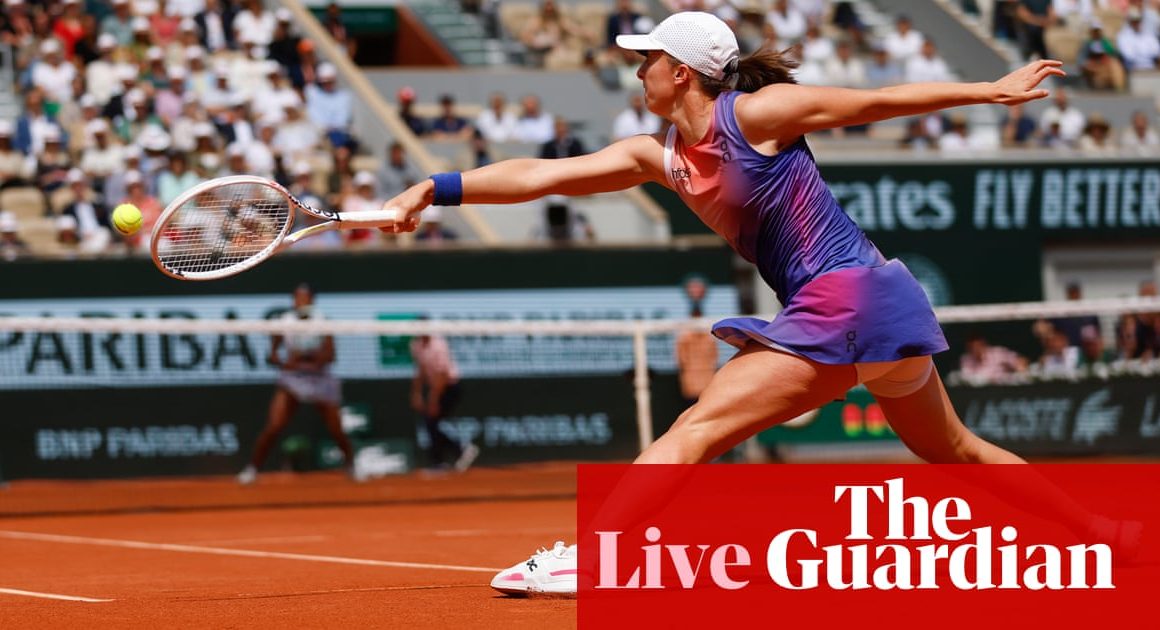Ukraine says it has withdrawn troops in parts of Kharkiv region
Ukraine has pulled back troops near several villages in the north-eastern Kharkiv region, where Russian forces have been advancing and pounding settlements along the border since last week, Kyiv announced.
Moscow launched a surprise major ground assault on the region last week as it seeks to advance across the battlefield with Kyiv struggling for arms and manpower.
âIn some areas, around Lukyantsi and Vovchansk, in response to enemy fire and assaults from ground troops, and to save the lives of our servicemen and avoid losses, our units manoeuvred and moved to more advantageous positions,â the Ukrainian military announced overnight between Tuesday and Wednesday, according to Agence France-Presse (AFP).
Throughout the two-year year war, both sides have typically used the language of moving to more âadvantageous positionsâ to signify retreats, write AFP.
The two villages â about 30 kilometres (18 miles) apart â are close to the border with Russia and have been targeted in the fresh offensive.
Ukraineâs general staff said the situation âremains difficultâ but insisted that its forces were ânot allowing the Russian occupiers to gain a footholdâ.
Kyiv has rushed reinforcements to the area to prevent Russia from punching through.
AFP report that some military analysts say Moscow may be trying to force Ukraine to divert troops from other areas of the frontline, such as around the strategic town of Chasiv Yar in the Donetsk region, where Russia has also been advancing.
âDonetsk and Kharkiv regions are where it is most difficult now,â Ukrainian president Volodymyr Zelenskiy said in an address on Tuesday evening.
Key events
Intensifying war increasing threat to Ukraine economy, EBRD warns

Larry Elliott
Larry Elliott is the Guardianâs economics editor.
Ukraineâs war-torn economy faces a renewed threat as Russiaâs intensifying war takes its toll on power plants and forces Kyiv to send key workers to the frontline, the European Bank for Reconstruction and Development has warned.
In its latest economic update, the EBRD cut its growth forecasts and said more than two years of fighting in Ukraine was affecting not only the warring countries but also their neighbours.
Beata Javorcik, the EBRDâs chief economist, said the war was âcasting a long shadowâ as she announced the bank had cut its growth forecast for the regions in which it operates from 3.2% to 3% this year.
The EBRD was set up to help rebuild the economies of the former Soviet Union and eastern Europe after communism collapsed in the early 1990s, but subsequently expanded to offer support to countries in the Balkans, the Middle East and north Africa.
Interviewed by the Guardian after Russiaâs offensive towards Ukraineâs second city, Kharkiv, Javorcik said: âThe war has intensified. Mobilising additional men to fight will hit the economy, and the destruction of power generation is something that will have repercussions. The situation is challenging.â
Heavy bombing in March and April had cut Ukraineâs electricity production by 40%, with many thermal and hydro plants destroyed, she said.
You can read Larryâs full report here:
Volodymyr Zelenskiy cancels visit to Spain and Portugal
Ukrainian president Volodymyr Zelenskiy has cancelled a visit to Spain and Portugal, authorities said on Wednesday, with CNN Portugal and other media reporting it was because of renewed fighting in his country.
King Felipe of Spain was due to hold a reception for Zelenskiy on 17 May and host a meal in his honour. Zelenskiy had also been expected to sign a bilateral security cooperation agreement with prime minister Pedro Sánchez after a joint declaration by Nato last year.
According to the Reuters news agency, a spokesperson for the Portuguese government said Zelenskiy had cancelled the visit but did not give a reason, while the Spanish government said it could not comment for security reasons.
Zelenskiyâs planned visit was due to coincide with an EU pledge of long-term security support for Kyiv, according to a draft document reports Reuters.
Kyiv on Wednesday morning cancelled some emergency power blackouts that it had introduced to deal with a drop in temperatures that had put pressure on its battered energy system, reports AFP.
State power operator Ukrenergo had announced a series of overnight and early morning power cuts to deal with âthe cold weather amid the consequences of Russian shellingâ that has destroyed swathes of Ukraineâs generating facilities.
âEmergency shutdowns in Kyiv, the Kyiv region, the Odesa region, the Donetsk region and the Dnipropetrovsk region were lifted,â DTEK, the countryâs largest private energy operator said.
Opening summary
It has gone 10.30am in Kyiv and in Moscow. This is our latest Guardian blog covering all the latest developments over the Russia-Ukraine conflict.
Ukraine has pulled back troops near several villages in the north-eastern Kharkiv region, where Russian forces have been advancing and pounding settlements along the border since last week, Kyiv announced.
âIn some areas, around Lukyantsi and Vovchansk, in response to enemy fire and assaults from ground troops, and to save the lives of our servicemen and avoid losses, our units manoeuvred and moved to more advantageous positions,â the Ukrainian military announced overnight between Tuesday and Wednesday, reports the Agence France-Presse (AFP) news agency.
âDonetsk and Kharkiv regions are where it is most difficult now,â Ukrainian president Volodymyr Zelenskiy said in an address on Tuesday evening.
More on that in a moment, but first, here are the other latest developments:
-
Large fires were reported around the Russian-controlled Belbek airbase on occupied Crimea on Wednesday morning after the governor of nearby Sevastopol said the city had come under âmassiveâ Ukrainian missile attack. Nasaâs satellite fire monitoring system, Firms, showed several large hotspots on the Belbek airbase. Mikhail Razvozhaev, the governor, confirmed a missile attack on the airbase, as well as over the Black Sea, and said âfragments of a downed missileâ fell on the city itself. The Russian defence ministry later said 10 Atacms long-range missiles had been launched at Crimea.
-
The US is considering sending an extra Patriot air defence battery to Ukraine, according to Bloomberg. It comes after the US secretary of state, Antony Blinken, arrived in Kyiv on Tuesday on his first visit to Ukraine since a major US aid package was passed last month. Blinken, who arrived by train from Poland in an unannounced visit, met Ukraineâs president, Volodymyr Zelenskiy. âSome of it has already arrived and more of it will be arriving,â said Blinken of the US aid. âAnd thatâs going to make a real difference against the ongoing Russian aggression on the battlefield.â
-
Zelenskiy described the US aid as crucial, and thanked Blinken, but also said Ukraine desperately needed two more air defence systems to protect the city of Kharkiv, which has been hit repeatedly by Russian strikes in recent weeks.
-
Blinken joined band 19.99 on stage at Barman Dictat, picking up a red guitar to play Neil Youngâs Rockinâ in the Free World. âYour soldiers, your citizens â particularly in the north-east, in Kharkiv â are suffering tremendously. But they need to know, you need to know, the United States is with you, so much of the world is with you and theyâre fighting not just for a free Ukraine, but for the free world. And the free world is with you, too,â Blinken said before playing the song.
-
Russia said on Tuesday it had taken a 10th border village, Buhruvatka, in Kharkiv region. The police chief in Vovchansk, a town 5km (three miles) from the border that has been the target of one of the main Russian thrusts, reported exchanges of fire in the north of the town.
-
Russian strikes on residential areas in the centre of Kharkiv city injured 20 people on Tuesday, officials said.
-
Ukrainian grid operator Ukrenergo said on Tuesday that power shortages caused by damage from Russian strikes had prompted controlled countrywide cuts from 9pm to midnight. âThe reason is a significant shortage of electricity in the system as a result of Russian shelling as well as increased consumption because of cold weather,â Ukrenergo said.
-
The Russian president, Vladimir Putin, will visit China on 16-17 May, Chinese state media reported.
-
Joe Biden has signed legislation broadly supported in Congress that prohibits any imports of Russian uranium into the US from 12 August. Russia provides about 20-30% of the enriched uranium used in the US and Europe and 44% globally, according to the US energy department. The legislation will release $2.72bn in funding for the energy department to invest in uranium enrichment inside the US.
-
Russia has put its Bulava intercontinental ballistic missile into service, the Tass state news agency reported on Tuesday, citing the systemâs chief designer.
Ukraine says it has withdrawn troops in parts of Kharkiv region
Ukraine has pulled back troops near several villages in the north-eastern Kharkiv region, where Russian forces have been advancing and pounding settlements along the border since last week, Kyiv announced.
Moscow launched a surprise major ground assault on the region last week as it seeks to advance across the battlefield with Kyiv struggling for arms and manpower.
âIn some areas, around Lukyantsi and Vovchansk, in response to enemy fire and assaults from ground troops, and to save the lives of our servicemen and avoid losses, our units manoeuvred and moved to more advantageous positions,â the Ukrainian military announced overnight between Tuesday and Wednesday, according to Agence France-Presse (AFP).
Throughout the two-year year war, both sides have typically used the language of moving to more âadvantageous positionsâ to signify retreats, write AFP.
The two villages â about 30 kilometres (18 miles) apart â are close to the border with Russia and have been targeted in the fresh offensive.
Ukraineâs general staff said the situation âremains difficultâ but insisted that its forces were ânot allowing the Russian occupiers to gain a footholdâ.
Kyiv has rushed reinforcements to the area to prevent Russia from punching through.
AFP report that some military analysts say Moscow may be trying to force Ukraine to divert troops from other areas of the frontline, such as around the strategic town of Chasiv Yar in the Donetsk region, where Russia has also been advancing.
âDonetsk and Kharkiv regions are where it is most difficult now,â Ukrainian president Volodymyr Zelenskiy said in an address on Tuesday evening.









